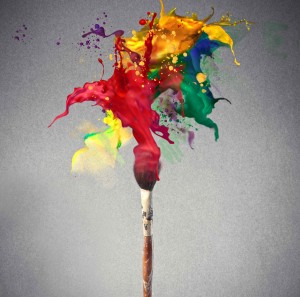One key realisation that the Buddha discovered was that all conditioned phenomena being impermanent is subject to change (according to conditions and not our wishful thinking!); being subject to change in this way, is not conducive to satisfy our whims and fancy … i.e. not conducive to being satisfactory or happiness, at least not stable, dependable tangible happiness or pleasure.
In Samyutta Nikaya 22: Anatta-lakkhana Sutta: The Discourse on the Not-self Characteristic, the Buddha declares
“Bhikkhus, form is not-self. Were form self, then this form would not lead to affliction, and one could have it of form: ‘Let my form be thus, let my form be not thus.’ And since form is not-self, so it leads to affliction, and none can have it of form: ‘Let my form be thus, let my form be not thus.’ ~ The Buddha [1]
Beyond form (ie physical matter, including our very own body), the
Buddha further declares how, like form, the other aggregates of feeling, perception, volition formation, consciousness (collectively this latter four is what we call mind, heart etc) also does change simply according to our wishes.
Our very existence, this body and mind being of this nature, is hence, put to the question
“Now is what is impermanent, what is painful since subject to change, fit to be regarded thus: ‘This is mine, this is I, this is my self’?” ~ The Buddha [1]
This and countless suttas point to the truth of no-self, or not-self. That there is no substantial, permanent, unchanging ‘self’ that can be found within or without the five aggregates, that the five aggregates are not self.
However, the Buddha also saw that sentient beings tend to see wrongly, and have perversions, inversions, distortions of perception, of mind, of view.
“Perceiving constancy in the inconstant, pleasure in the stressful, self in what’s not-self, attractiveness in the unattractive”
~ The Buddha [2]
2600 years after the Buddha’s awakening and thus Buddhahood, Daniel Gilbert, psychology researcher at Harvard university is coming to a similar realisation that despite our sense of a permanent core, identity, values, personality etc, i.e. self, we are indeed subject to change. In an article “You Can’t See It, But You’ll Be A Different Person In 10 Years” [3]
No matter how old people are, they seem to believe that who they are today is essentially who they’ll be tomorrow.
That’s according to fresh research that suggests that people generally fail to appreciate how much their personality and values will change in the years ahead — even though they recognize that they have changed in the past.
Daniel Gilbert, a psychology researcher at Harvard University who did this study with two colleagues, says that he’s no exception to this rule.
“I have this deep sense that although I will physically age — I’ll have even less hair than I do and probably a few more pounds — that by and large the core of me, my identity, my values, my personality, my deepest preferences, are not going to change from here on out,” says Gilbert, who is 55.
From the Buddha’s teachings, we are invited to see for ourselves if there is really anything permanent, substantial, unchanging that we can call “Mine, I or my self” or soul.
Seeing that such a permanent entity such as an “I” do not exist, we realise that the very idea that “I am a fixed entity” is flawed to begin with. We cannot even exist or survive if we cannot change physically and mentally.
“If one’s heart is unchanging, then it would have been impossible for the two parties to even start liking each other.”
~ 你變心了 Your heart has changed! [4]
Even the very relationships we have with others are not “permanent, fixed and unchanging”, for if they were, friendships cannot come to be, love cannot sprout and feuds must have existed to begin with or never fester.
Unconsciously, we hold onto the notion that “I” am fixed and cannot, will not change. We project this notion onto others and expect others not to change too! If we like a person, we tend to attribute all the goodness solely to that person, ignoring all other (ever changing) conditions, including that very person who is changing
as well. We then expect that person to perpetually fit our perception … and NOT CHANGE. Are we setting ourselves up for disappointment or what?
Likewise, when we dislike a person, we tend to attribute all the unpleasantness solely to that person, ignoring all other (ever changing) conditions, including that very person who is changing as well. We then (ironically!) expect that person to perpetually fit out perception … and NOT CHANGE. Do we give others a chance to change?
Realising that there is no fixed entity, we learn to appreciate even more deeply the relationships we have with others, for it is not a fixed, unchanging link that we can take for granted. Conversely, this same realisation also liberates us from a fixed negative pattern or relationship we may have had; we give both others and ourselves the chance to grow the relationship towards a positive direction.
The Buddha’s teaching of anatta (無我) no-self / not-self ultimately leads us to the realisation that there is nothing worth while for us to be attached to, and nothing permanent, unchanging or substantial that we can grasp onto anyway, giving rise to Final Liberation, Nirvana (Pali: Nibbana).
So, what do you wish to change this next three months?
References


